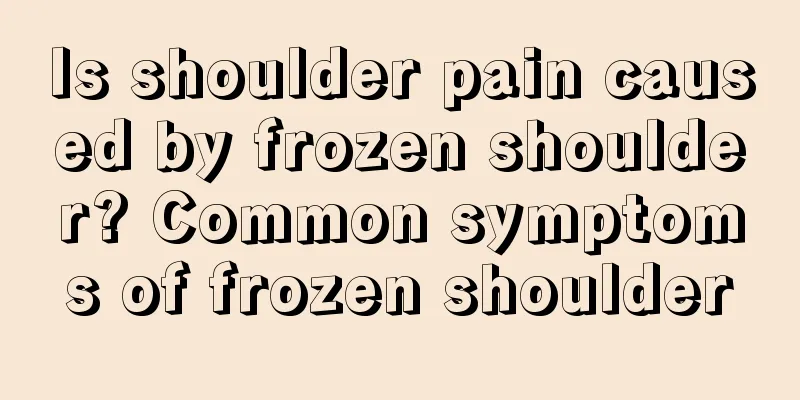Is shoulder pain caused by frozen shoulder? Common symptoms of frozen shoulder

|
The most common cause of shoulder pain is frozen shoulder, which is very common among middle-aged and elderly people. Frozen shoulder can be acute or chronic. Pain is the most typical symptom of frozen shoulder. Conservative treatment can be used to treat frozen shoulder, and more exercise can be done in daily life. 1. Pain in the acute phase Pain is the main clinical manifestation of patients with acute periarthritis of the shoulder, which is mostly induced by climate change or fatigue. It manifests as paroxysmal pain around the shoulder joint. The pain is severe, often worsens at night, and can even affect sleep. The pain range is relatively wide, and there may be obvious tenderness near the shoulder joint. Muscle spasm: Patients with periarthritis of the shoulder in the acute stage may experience local muscle spasms at the same time as severe pain, mainly due to the reflexive muscle spasm caused by the sudden and severe local pain. Limited movement: The active and passive movements of the shoulder joint in all directions will be restricted. When the patient's shoulder is pulled, it will cause severe pain, which may radiate to the neck and elbows, and even cause varying degrees of deltoid muscle atrophy. 2. Tenderness during the remission period : For patients with frozen shoulder in this period, although the shoulder pain will gradually decrease or disappear, the local tenderness is still obvious and the tenderness range is relatively wide. Joint stiffness is caused by the limitation of joint function due to protective muscle spasm in the acute phase and develops into joint contracture dysfunction. In this phase, patients have severely limited shoulder joint movement, extensive adhesion of soft tissue around the shoulder joint, shoulder joint contracture and stiffness, which gradually worsens and becomes frozen. The range of motion of the shoulder joint in all directions is significantly reduced compared to normal people. In severe cases, the movement of the scapulohumeral joint may completely disappear, leaving only the scapula-thoracic joint. People with a long course of muscular atrophy may experience mild muscular atrophy, which is more common in the deltoid muscle, shoulder girdle muscle, supraspinatus muscle, infraspinatus muscle, especially disuse atrophy of the deltoid muscle. 3. Recovery period: The pain of patients with periarthritis of the shoulder can basically disappear during the recovery period. Some patients will have slight pain, the shoulder joint will slowly relax, and the range of motion of the shoulder joint will gradually increase. A small number of patients still have symptoms of limited motor function after the recovery period. 4. Tips: Periarthritis of the shoulder is a self-limiting disease. The current treatment for periarthritis of the shoulder is mainly conservative treatment. The length of the recovery period is related to the duration of the acute and chronic phases. The longer the freezing period, the slower the recovery; the shorter the course of the disease, the faster the recovery. Therefore, timely and effective treatment and exercise are the key to treating and shortening the course of the disease. |
<<: What are the symptoms before death in late stage of hepatic ascites
>>: What are the traditional methods for treating eczema
Recommend
I got my finger pricked by a fish bone while washing fish
Fish is a very popular meat with extremely high n...
How much does early treatment of colorectal cancer cost
Everyone wants to have a healthy body, but many h...
What to do with facial burn scars
Many people suffer severe burns on their faces du...
How to make white clothes white if they turn yellow?
No matter what season it is, white clothes are in...
Symptoms of a sore nose_What are the symptoms of a sore nose
There are reasons for a sore nose, but many peopl...
What causes sigmoid colon cancer
Sigmoid colon cancer is a type of colon cancer. E...
Is it okay to eat one egg a day?
We have all eaten eggs, right? Eggs are particula...
What is the dietary therapy for lung cancer turning into bone cancer
If a cancer patient has been diagnosed with metas...
How to fry screws so that they are easier to suck
Most people who like to eat snails not only like ...
Can eating watermelon help you sober up?
Nowadays, people drink when they are happy, drink...
Is it useful to put wind oil in the room
I believe many people don't know what are the...
What does a hip thrust do?
Many people don't know what hip push is. In f...
How to check lymphoma
As we all know, cancer is a disease with a very h...
What are the dietary precautions after chemotherapy for lung cancer? Pay attention to these two aspects
After chemotherapy for lung cancer, patients need...
The 3 main symptoms of prostate cancer
Prostate cancer is a disease that only occurs in ...









